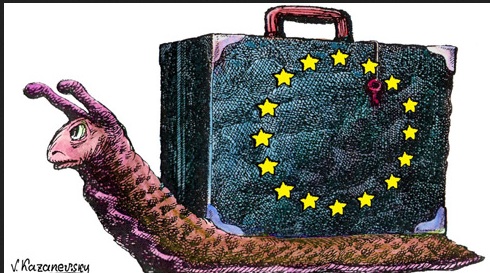Dirk Schumer writes: Greece vs. Germany: What a drama! Any Hollywood screenwriter would delight at the brutality of this particular marriage. One launching accusations of fraud and theft, the other responding with calls for World War II debt repayment and reparations. Flags and depictions of the German chancellor have been burned. Cruel jokes circulating about the indebted south, with visiting politicians from the north requiring added police security.
Unfortunately, this is not fodder for a fictional screenplay but a political reality in Europe since 2008. It seems that while this aggressive marital drama plays out, its protagonists are unaware of just how much damage has been done to the foundation of the European Union. Is all that’s left of Europe the rubble of the past?
When the European idea took its beautiful and potentially healing shape after 1945, it was indeed built on rubble. Nowhere else in the world was there more to be found. Nowhere else was there more European common ground than at Auschwitz, where people of all European nationalities were murdered.
Among the ruins of Caen to Nuremberg, from Rotterdam to Milan, the national fight of everyone against everyone else, which had raged in Europe since the downfall of the Roman Empire, was to be discarded onto the dung heap of history. This was to be a bulwark against the anti-democratic Soviet Union, and economic pragmatism was to be the cure-all.
Instead of Napoleon, Bismarck or Hitler, there were mild, wise and mostly Catholic political veterans such as Konrad Adenauer, Charles de Gaulle and Alcide de Gasperi, who managed to disperse international problems by forming new commissions.
Slowly but surely even the worst wounds of the most recent past closed and became scars whose pain was bearable without national sovereignty ever having to be discussed. Europe was not decided upon openly but was bargained in secret with debates about fundamental principles.
But somehow something went wrong in the factory of compromises formed in Brussels, Luxembourg and Strasbourg. Later, historians may identify the tipping point as being somewhere between the introduction of the euro (1998-2001) and the failed 2005 attempt at a European constitution.
If the EU is seen as a common market, bringing together what can’t actually be united, the euro contributed to this disaster in creating a social centrifuge.
But it gets even worse: The democratic deficiencies that had been tolerated due to the advantages of a common market and porous borders have become unbearable to EU citizens. The black hole that once was European responsibility has obediently swallowed binding legal contracts on national debt arrangements, and freedom of travel and refugee treatment, these now being worth less than nothing from the UK to Greece.
That which we once called the European spirit has been annihilated in the process.
The dismantling of Ukraine and the destroyed landscapes of the former Yugoslavia have demonstrated what smoldering hate in a weak confederation of states can do. Is it too late? Or are reports of the EU’s death premature?

